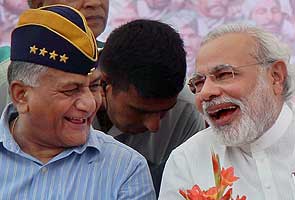New Delhi, Sep 24: Under attack over reports that attempts were made to topple the Jammu and Kashmir government during his tenure as Army Chief, retired Gen V K Singh claimed that "certain ministers" in the state are given money by the army for "stability" and that this has been going on since Independence.
Singh, who is in the eye of the storm over the charges, told TV channels that the accusations against him were false and motivated.
"Army transfers money to all the ministers in Jammu and Kashmir. .. because there are various things to be done and ministers have to do so many things as part of the stabilising factor in the state and for organising various activities," he told Times Now.
Questioned whether all ministers are paid, he amended his statement, saying, "May be not all the ministers but certain ministers and people who are given a certain sum to get a particular thing done. That job involves bringing stability to a particular area."
Asked to explain reasons, Singh argued, "There are times like ... who funded KPL (Kashmir Premier League)? Did the JK government or Omar Abdullah fund it? The Army funded it."
Gen Singh, whose tenure as the Army Chief was shrouded in a controversy over his date of birth, argued, "Kashmir is a different issue altogether. A lot of things are done where you do a lot of civic and youth work. For all this, money is needed. A certain amount of money is given for these works. Where is the problem?
He was responding to allegations that a minister in the J and K Ghulam Hassan Mir was paid Rs 1.19 crore by the Technical Support Division (TSD) set up during his tenure to destabilise the state government.
Asked if a minister like Mir takes money and siphons it off, Singh said, "I do not think so. We have a system to ensure its accountability. There are proper receipts and enured that the work given is done."
He went on to add, "This had been going on in J and K since Independence. This is a system to ensure that all the governments are helped. To ensure things are done. This is nothing new."
When pressed, he said, "There are things which happen in J and K which are inimical to the country. We have a job -- that is to keep the country together... If we find that we can help, that integrity can be maintained, if we find things can be done, then the army steps in."
Talking separately to CNN-IBN, he denied that the army had any link with an NGO YES Kashmir which had filed a PIL against present Army Chief Gen Bikram Singh in connection with an encounter in Kashmir when he was a Brigadier, apparently to scuttle his elevation to the top post.





Comments
Add new comment